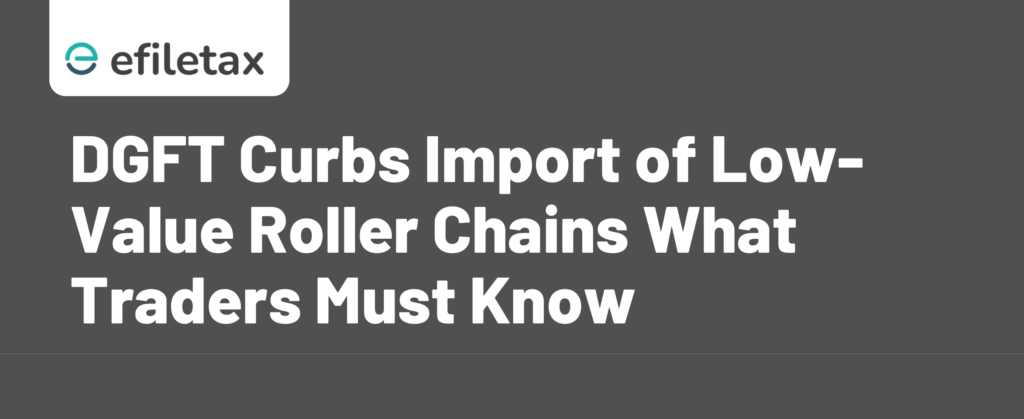
DGFT Restricts Low-Value Roller Chains New Import Policy Update
In a move aimed at curbing sub-standard imports and supporting domestic manufacturing, the Directorate General of Foreign Trade (DGFT) has restricted the import of low-value roller chains under Chapter 73 of ITC (HS), 2022, Schedule – I (Import Policy).
This DGFT notification came into effect immediately and applies to specific goods under the “Iron and Steel Articles” category.
Let’s decode what this means for importers, MSMEs, and supply chain stakeholders.
What Are Low-Value Roller Chains?
Roller chains are essential mechanical components used in:
- Bicycles and motorcycles
- Industrial machines
- Agricultural tools
- Conveyor systems
Low-value chains, often imported from cheaper manufacturing countries, have been flagged for poor quality, posing risks in high-load applications.
What Exactly Has DGFT Restricted?
The policy change relates to Chapter 73 of ITC (HS) 2022, Schedule I, which governs imports of:
- Articles of iron or steel
- Including specific roller chains of inferior grade/value
Here’s what the restriction means:
| Old Policy | New Policy |
|---|---|
| Free import allowed | Now Restricted (Requires DGFT License) |
To import these items now, businesses must:
- Apply for an import license through DGFT’s online portal
- Provide end-use details and technical specifications
- Comply with quality control orders (QCOs), if applicable
🔗 Check the official DGFT Trade Notice for product codes and specific HS classifications.
Why This Restriction Now?
According to government sources and industry feedback:
- Cheap imports were undercutting Indian MSMEs
- Many products failed to meet BIS (Bureau of Indian Standards) norms
- The move supports Make in India and Atmanirbhar Bharat by boosting domestic manufacturing
Expert Insight:
“We’ve seen a rise in failure rates of imported low-cost roller chains in industrial use. This DGFT move forces better quality control and gives Indian manufacturers breathing space to compete.”
– Rajeev Bansal, Mechanical Engineer & MSME Supplier, Pune
How Should Importers Respond?
Immediate Steps:
- Check HS Code of your imported product
- Apply for a license via DGFT Portal if applicable
- Reassess supplier contracts to ensure BIS compliance
Long-Term Tips:
- Evaluate Indian suppliers who meet QCO/BIS standards
- Plan for longer lead times due to import licensing
- Stay updated via DGFT Trade Notices & CBIC Circulars
Legal Angle:
This restriction is issued under Foreign Trade (Development and Regulation) Act, 1992, read with Para 1.03 and 2.01 of the FTP 2023.
⚖️ Importers violating the updated import policy may face:
- Confiscation of goods
- Penalty under Section 11(2) of the FTDR Act
FAQ: DGFT Roller Chain Restriction
Q1. What is the notification number?
DGFT has not published a separate numbered notification but updated the import policy table directly on the portal.
Q2. What qualifies as “low-value”?
Not explicitly defined. However, chains that do not meet performance/BIS benchmarks or are below standard material cost will likely fall under this.
Q3. Can I still import for R&D or testing?
Yes, but you must apply for a license and justify the use-case clearly.
Summary
DGFT restricts import of low-value roller chains under Chapter 73 of ITC (HS), 2022. Importers must now obtain licenses and ensure BIS-compliance. The move supports Make in India and curbs sub-standard imports.
Final Thoughts
This restriction is part of India’s broader shift towards import quality regulation and domestic capacity building.
Importers and OEMs must now align sourcing and compliance strategies accordingly.